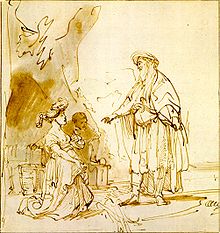Goel

Goel (go'el) is a Hebrew term derived from the word ga'al (redeem, balance) and consequently means redeemer or compensator , which in the Bible and rabbinical tradition denotes a person who is the closest of kin responsible for restore the rights of the loved one and avenge the injustice suffered. In today's editions of the Bible the term is translated as "relative", "redeemer", "messiah" and "avenger".
In the book of Isaiah , YHWH (God) is called the Redeemer of Israel when he redeemed his people from captivity . The context illustrates that salvation involves moving on to something greater. In Christianity , the title Goel refers to Christ , who is believed to redeem people from sin and its consequences by sacrificing himself as a ransom .
The suffering Job appeals against his friends, who persuade him, and against the God who took everything from him, to his goel : "I know, my Redeemer lives, he is the last one to rise above the dust" ( Job 19.25 EU ) - a statement that is difficult to interpret and that was particularly well received in Christianity.
Duties of the Jewish legal institution of the Goel
The Goel's duties include the task of redeeming relatives from slavery if they can buy an enslaved relative free or if the relative can do it himself ( Leviticus 25 : 48-49), to buy back property from relatives who sell it out of poverty had to, blood revenge , to marry the widow of the brother in order to father a son who carries on the name of the brother ( Deuteronomy 25,5-6) and to receive reparation if an injured relative dies ( Numbers 5,7).
Numbers 35,9-30 regulate the duties of the Goel. The congregation has to judge the case before handing over a murderer into the hands of the Goel. More than one witness is required for a guilty verdict. In the event of accidental manslaughter, the manslaughter can save his life by escaping to a "city of protection" and staying there for the term of the high priest (who serves for life). Ransom / ransom is not allowed for homicides. Retaliation must not be committed against relatives of an offender (Deuteronomy 24:16). Leviticus 25: 48-49 determines, according to rabbinical interpretation, the order in which close relatives can consider a goel if a slave is to be redeemed: brothers, uncles, cousins and then other relatives. The same order was followed in other cases, except for the marriage of a sister-in-law.
Jewish tradition also gave the avenger the role that today the public prosecutor plays , who is active in the case for the victim. He is responsible for bringing the perpetrator to justice, finding evidence against him, presenting the case to the court and summarizing the harm caused by the perpetrator. Likewise, it is his job to argue against the sinner's defenses.
Individual evidence
- ↑ Dr. Itamar Varhaftig: Techumin, Volume 11, p. 326. According to Rabbi Uri Dasberg: Torah and Law: Blood Vengeance ( Memento of the original from April 18, 2009 in the Internet Archive ) Info: The archive link was inserted automatically and has not yet been checked. Please check the original and archive link according to the instructions and then remove this notice. Shabbat-Zomet, December 13, 1997.
Web links
- Donald A. Leggett: The Levirate and Goel Institutions in the Old Testament With Special Attention to the Book of Ruth (PDF; 1.3 MB) Dissertation at the Free University in Amsterdam. Cherry Hill, NJ 1974, Mack Publishing Company.
